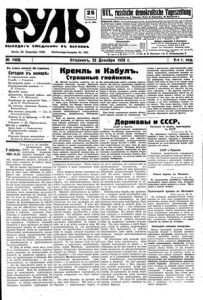this one from Vladimir Nabakov. A mail from The New York Review of Books today offers a free read (for the moment anyway), and I quote:
“In the Review’s November 16, 1995, issue, we featured a new translation, by Dmitri Nabokov, of a 1928 short story by his father, Vladimir. “The Christmas Story,” originally published on December 25, 1928, in the Berlin Russian-language journal Rul’, tells the tale of a preeminent writer in the new USSR, a once-great master now despairing of finding a new subject in a changed world and unable to shake from his mind the image of a Christmas tree. Nabokov’s story may be read for free [here].”
The New York Review of Books, December 26, 2021.
(Update: January 12th 2022 - Unfortunately, the above link now appears to go only so far, and a subscription is required to read the complete story.)

Reading this, and with the Soviet now relegated to the annals of history, and Russia in the steely grip of an autocrat and an oligarchy that accommodates (and flirts with to various degrees) the Orthodox church, Nabokov’s story is ostensibly one particular to its time. But, the symbolism of a Christmas tree, with a red star atop in jest, for instance, or as a representation of the fusion of the Church with Western capitalism, retains its resonance for the contemporary reader; for a virulent and state-mandated nationalism and anti-West (if not anti-capitalist!) tenor flourishes still in post-Soviet Russia, as it did in those post-revolutionary days at its beginnings in the midst of which the Nabakov family’s fate was mired.
And, in any era, in this time, there are countless who know and as many who can imagine, the totality of the immigrant experience – what you take with you and what you leave behind. And, the baggage is most heavy with the customs and beliefs of all those formative years preceding departure; often treasured more in the chosen land than ever done in the old country. Nabakov’s short story beautifully conveys the dichotomy of experience with which many peoples of the Soviet countries had to grapple – at home and abroad – and imagined in the person of an older, eminent writer looking for literary inspiration in an increasingly uniform and sterile society while remaining true to the system of collective will. Just as the nostalgic Novodvortsev could not escape the vision of his country folk gathered about the light and riches of a Christmas tree, nor could the comrade Novodvortsev that of the poverty and injustice lurking in its shadow. Comrade N. wins out in the end – reason, as he sees it, trumping emotional flights of fancy that would herald only trouble.
With triumphal agitation, sensing that he had found the necessary, one-and-only key, that he would write something exquisite, depict as no one had before the collision of two classes, of two worlds, he commenced writing. He wrote about the opulent tree in the shamelessly illuminated window and about the hungry worker, victim of a lockout, peering at that tree with a severe and somber gaze.
1928, Translated from the Russian by Dmitri Nabokov
The Russian émigré newspaper Rul’ was founded by Nabakov’s father in 1922 by the way, and a copy of the story as originally published – under the pen-name of Vladimir Sirin (Владимир Сирин) – is accessible here at the Berlin library (page 2 and 3). Nabakov lived in Berlin from 1922 until 1937 – a long time and an eventful time in the history of the world. His father was assassinated there, he was married and his son was born there, Berlin was the setting for his early writing and novels. But Nabakov remained ambivalent, even distrustful, of the city and its people, had few German friends, spoke the language not well and remained firmly entrenched in the Russian émigré community. Presumably, he was so lacking in knowledge of German politics and the affairs of state that the events of 1933 came as a surprise for him! We are talking about the twenties in Berlin! Party or poverty and not much in-between – well, so the common narrative. But for Nabakov, seemingly, an uninspiring time. Or is something missing in this version? I am not totally convinced. As a matter of interest, this very informative piece about the Berlin of those years is on the still active website of Dieter E. Zimmer (✝2020) – and lots of other stuff about Nabakov is also there to be explored.

